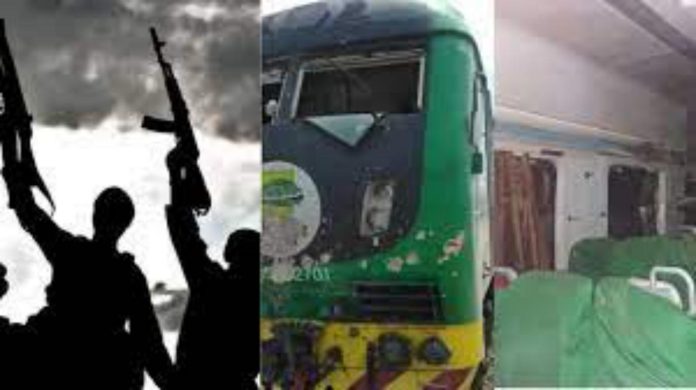Nigerians will forever remember 28 March 2022 with anguish and anger as a tragic emblem of Major General Muhammadu (rtd)’s government’s failure. The bombing of a train heading to Kaduna from Abuja at Katari, a village on the journey’s route, and the subsequent swooping of armed men riding on motorbikes on the passengers resulted in the death of at least eight people.
The lives so brutally cut short included those of two trade union leaders; Musa Lawal-Ozigi, Secretary General of the Trade Union Congress (TUC), and Akin Akinsola, the Kwara state chair of TUC, who were going to Kaduna for a meeting of the TUC political commission. Megafu Chinelo, a brilliant 29-year-old doctor who posted on Twitter “I’m in the train. I have been shot. Please pray for me”, was also one of those we lost to this attack.
The bandits maimed or wounded many more of the almost 1,000 passengers on the train, while they abducted 62 of them. Their families had to go through excruciating moments of ransome negotiations with the abductors. The bandits did not release any of the abductees in batches before June. And in October, they released the last batch of abductees, comprising 23 people.
There were quite a few people who thought the attack would be a wake-up call for Major General Muhammadu Buhari (rtd)’s APC government to address the worsening state of insecurity in the country. But not only has the president run out of ideas, he and his disciples continue to live in a world of their own, claiming that they have improved on the situation they met eight years ago; which is an outright lie.
Since the train attack, thousands more have been killed by bandits and so-called Jihadists, who in July, also organised a jailbreak in Abuja, the federal capital territory, to free their members.
Neither the APC nor any other of the bosses’ parties can provide a solution to the problem of insecurity. Such a solution must be multi-pronged, as the African Action Congress points out in its programme for the revolutionary transformation of Nigeria. It must capture immediate steps to stop the bleeding. But, quite importantly, it must address the root causes of insecurity, and institute justice, public accountability, and assistance for victims,
The government’s drive for a military solution, with billions of naira allocated to defense with barely any result, is a wild goose chase. We need to strengthen the communities politically. This will include the setting up of Community Level Mediation Committees.
A well-thought amnesty programme rooted in an approach of “jobs for guns” will help undermine the ranks of insurgents and bandits. Many of their “soldiers” joined them out of hopelessness in the first place.
Addressing the root causes of insecurity requires investment in an economy that works for the millions of poor people and not a handful of elites. Victims of insecurity and members of the families of those killed must also be catered for. To do this, we must audit and expand the Victims Trust Fund.
The place of self-defense is equally crucial. An armed people, and not a band of armed men as soldiers, is the surest defense of working people for the working people themselves. SWL has consistently raised this point over the years. There have been some on the left who dismissed such an argument as a call for anarchy. But several governors and other ruling class elements have called on people to defend themselves, over the last year.
However, doing this as individuals, which is how the capitalists frame it, and without envisioning it as part of the working people’s fullest conquest of democracy, allows only the rich to be able to take the initiative. We must insist on self-defence as a democratic right. Thus, the government must train and make arms available to the people, under the control of their duly elected delegates in the communities and workplaces.
As we remember the victims of the train attack and all victims of the failure of the ruling class to secure the people’s lives, we demand that they not be forgotten. One of the steps to take in that direction would be a monument to honour them all.
by Baba AYE









